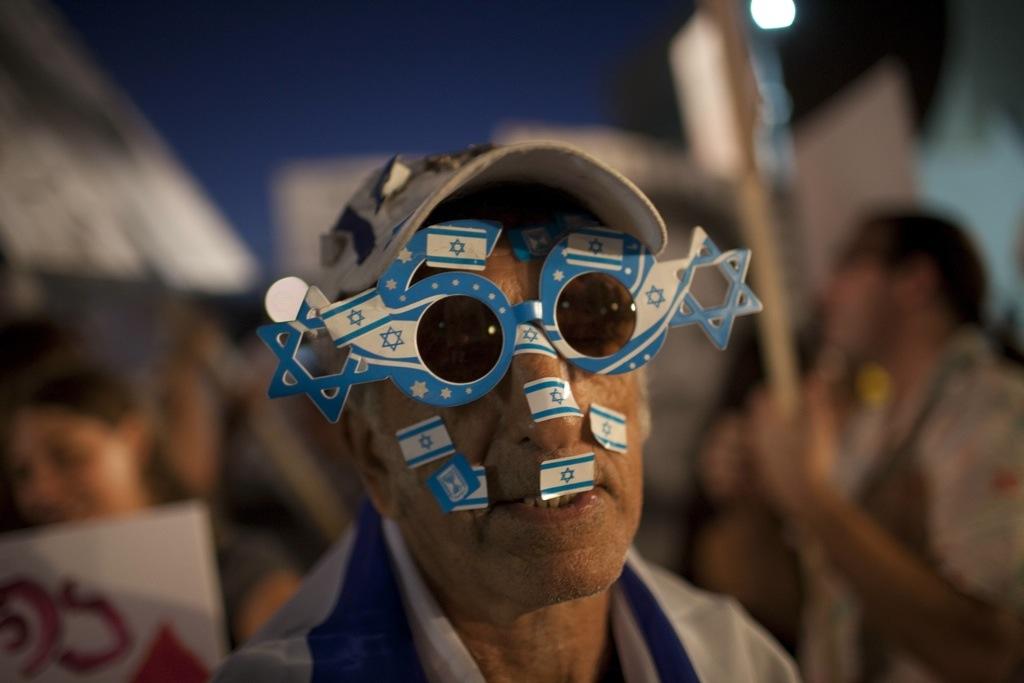Even good news is bad news for Israel
One of an estimated 400,000 Israelis demonstrates in the center of Tel Aviv on Sept. 3, 2011 protesting against rising housing prices and social inequalities in the Jewish state.
JERUSALEM, Israel — With diplomatic relations among neighboring countries at a breaking point, a UN vote on Palestinian statehood looming, and protests persisting and drawing support from unlikely sectors, Israeli Prime Minister Benjamin Netanyahu is experiencing, to put it lightly, a rough patch.
So it might have seemed a much needed ray of light in the midst of an otherwise dim couple weeks when the prime minister was informed on Friday that Standard & Poor’s, the same credit ratings agency that downgraded the United States to A- last month, had raised Israel's rating to an enviable A+.
FROM ISRAEL: The Negotiator: how to achieve peace “tomorrow” in Israel-Palestine
Instead, the ratings increase only served to provoke the derision of demonstrators, who have gathered in record numbers to protest what they say are deliberate, debilitating economic and social inequalities across all sectors of Israel’s population.
The paradox between Israel's booming economy and its massive protest movement was further underscored by the Finance Ministry’s recent announcement that the revenues of Israeli government-owned companies grew by over $800 million in 2010. The press release said that revenues for the publicly-owned companies amounted to almost $16 billion in 2010. In Standard & Poor’s announcement, the Israeli government was congratulated for its long-term economic stewardship.
Most governments would be glowing. But in Israel, the positive economic announcements only served to sharpen a widespread perception that the nation’s wealthy benefit disproportionately from its robust economy, while a faulty tax structure ensures that the workers behind the county’s impressive economic drive remain dependent on limited salaries.
FROM ISRAEL: Israel's political fabric begins to tear
The country's crisis deepened even further when protesters, who amassed by the hundreds of thousands on Sept. 3, for the first time openly clashed with police as they attempted to follow municipal orders to demolish and remove tent encampments that have taken over central squares in most of Israel's cities. Following several arrests the Supreme Court, responding to an urgent petition filed by protest leaders, suspended the evacuation order.
The future of the tent cities is now in question. Israel's winters are mild and it is not inconceivable that people could stay in the improvised shelters around the country indefinitely.
The ongoing protests, however, are only one prong in a multi-pronged assault on Netanyahu's leadership. Ties to former allies Turkey and Egypt, states that are in Israel’s close proximity, frayed to a breaking point last week as Israeli ambassadors in both countries were forced from their missions. The ambassador to Turkey was ordered out by the Turkish government after Israel’s refusal to apologize for Turkish deaths on the last Gaza flotilla. The ambassador to Egypt was evacuated by Israeli air force jets at dawn on Saturday after his embassy was invaded by an Egyptian mob.
At the same time, Netanyahu's Palestinian counterpart, Mahmood Abbas, remains immune to American cajoling and is determined to pursue a request for UN declaration of statehood on Sept. 20.
Israel has not found itself as isolated in its region since the mid-1970s, the years following the Yom Kippur/October War, before peace talks with Egypt began in 1979. On Monday, Jordan’s King Abdullah, facing an announced anti-Israel march this Friday in Amman, said that “the future of Jordan and Palestine is much clearer than that of Israel.”
Turkish prime minister Recep Tayyip Erdogan, vising Cairo on Monday in the first visit to Egypt of a Turkish leader in 15 years, said that the raid against the Turkish-owned flotilla was “cause for war.”
Erdogan is on the first leg of his “Arab Spring Tour,” in which he is attempting to establish himself as the new regional strongman.
On the domestic front, no one seems to be taking pity on Netanyahu. “The masquerade is over,” wrote Ha’aretz opinion columnist Sefi Rachlevsky.
Following the style of Warren Buffet, some of Israel’s most successful business people emerged last week to support the demonstrators, among them many in the hugely successful high-tech industry.
Erel Margalit, one of Israel’s most prominent entrepreneurs and a former candidate for Labor Party leadership, spent several nights sleeping at tent sites and over the past two months organized several public discussions with protest leaders on Rothschild Boulevard.
Addressing the apparent incongruity of newly monied high-tech millionaires supporting a mass movement that, among other things, aims to reduce their wealth, Margalit said that two very large and very different economies existed in Israel today, one populated by stultified tycoons and the other by the entrepreneurial high-tech industry that identified with social justice.
FROM ISRAEL: Israel braces for new terror
There is “the economy of the monopolies, run by a small number of families who depend on connections to the government to horde Israeli natural resources and maintain their hold over the Israeli market in goods and services. The bigger they are, the more “favors” they need.
“On the other hand, you have the hi-tech sector, which does not need any “favors” from the government. Huge companies like Checkpoint and Teva will never look to the government for restrictions on competition or for ways to monopolize the Israeli market. The monopoly economy is sucking the nation dry while the hi-tech sector continues to make the nation thrive.”
In tune with the boss, Ittai Arbel, 40, head producer at one of Margalit’s companies, The Animation Studio, said “there is no contradiction between the high-tech sector and this movement. High-tech is meritocratic and all about self-motivation and earned success. And what the social protestors are calling for is fairness and equitable access to success.”
We want to hear your feedback so we can keep improving our website, theworld.org. Please fill out this quick survey and let us know your thoughts (your answers will be anonymous). Thanks for your time!
